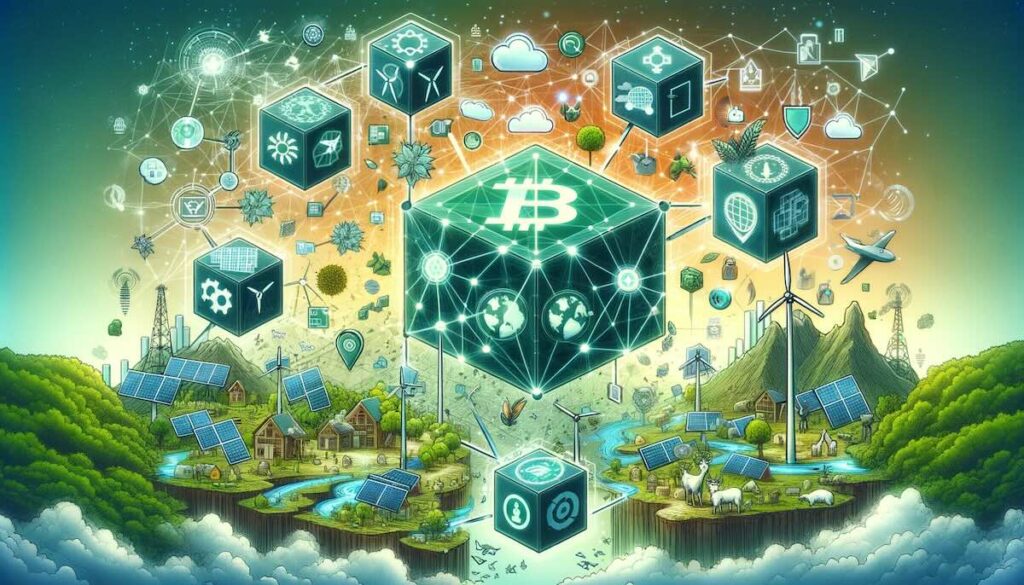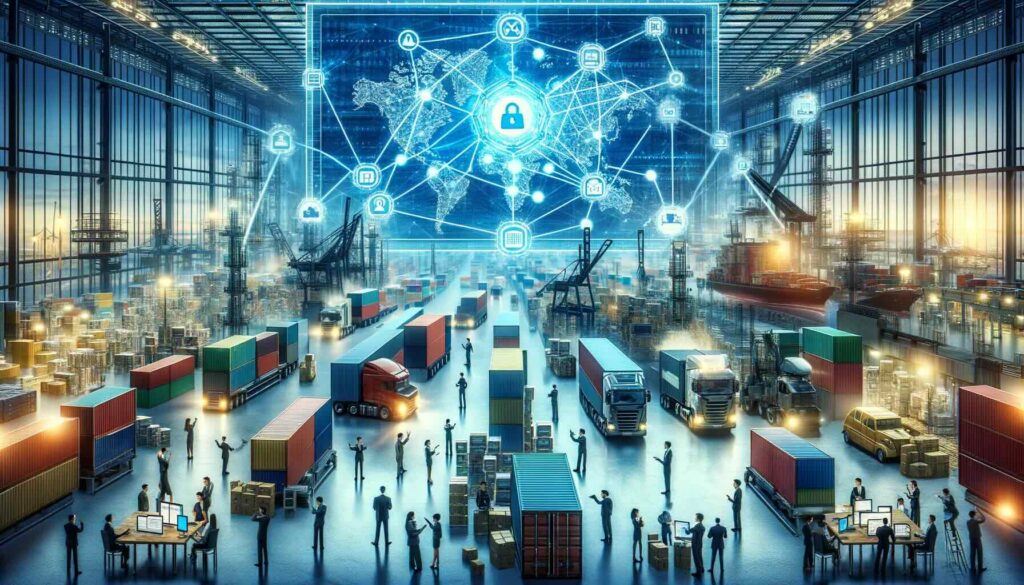Our planet faces big challenges, like pollution and climate change. Blockchain technology is more than just digital money; it’s a way to keep records forever that no one can mess with.
This blog will show you how blockchain helps save the environment by making things transparent and cutting waste. Ready to see how high tech meets green goals?.
Key Takeaways
- Blockchain makes sure data is true and cannot be changed, which helps people trust that products are made in a good way for the Earth.
- This technology lets everyone see how energy is used and waste is reduced by sharing information across many places at once.
- With blockchain, there’s no need for one person or group to be in charge. This makes it easier to work together on saving the environment.
- Smart contracts on blockchain can make sure money goes to projects that help the Earth.
- Blockchain could change how businesses work by making things clearer and cutting down on wasted time and resources.
Unique Features of Blockchain
The unique features of blockchain, such as immutability, distributed ledger, decentralized network, and consensus algorithm, offer a secure and transparent platform for various sustainability efforts.
These features enable trust and accountability in environmental initiatives.
Immutability
Immutability means that information on the blockchain cannot be changed once it’s there. This is key for sustainability because it creates trust in the data. For example, if someone puts details about how they make a product or where it comes from, no one can change this info.
This helps everyone know that ecofriendly and ethical sourcing claims are true.
Companies use blockchain to show they are using green technology and caring for the environment. They put their energy use or how much waste they reduce onto the blockchain. This way, everyone can see their efforts to lower their carbon footprint and believe what they say because the record cannot lie or be altered after being made.
Immutability makes sure data stays clean and honest which is super important for environmental conservation.
Distributed Ledger
The distributed ledger is a key feature of blockchain that offers a transparent and decentralized record-keeping system. Unlike traditional centralized databases, the distributed ledger allows multiple parties to have simultaneous access to a constantly updated digital record.
This facilitates trust among participants and ensures transparency in transactions related to sustainability efforts such as renewable energy tracking, waste management, and supply chain traceability.
With its distributed nature, this technology promotes open and transparent data sharing while decentralizing control away from single entities, aligning with the principles of sustainable development and environmental conservation.
In promoting sustainability initiatives, the distributed ledger feature of blockchain plays a crucial role in ensuring transparency, reducing waste, fostering sustainable practices across various sectors such as energy efficiency, climate action, and circular economy.
Decentralized Network
Blockchain’s decentralized network is a crucial feature that supports sustainability efforts by removing the need for a central authority. This enables environmental conservation and eco-friendly initiatives to be managed and governed by a distributed network of participants, ensuring transparent and sustainable systems.
The decentralized control over data and transactions aligns with the principles of conservation efforts, climate action, and the circular economy, making blockchain an ideal technology for promoting environmentally friendly initiatives.
Moving on to “Consensus Algorithm,” this aspect further enhances blockchain’s capabilities in supporting sustainability efforts through its unique approach to validating transactions.
Consensus Algorithm
The consensus algorithm is a crucial feature of blockchain technology. It ensures that all participants in the network agree on the validity of transactions, leading to trust and transparency.
Through this algorithm, environmental issues can be addressed by enabling eco-friendly practices in various sectors such as energy management, supply chains, waste tracking, and eco-friendly finance.
By leveraging the consensus algorithm, blockchain promotes decentralized decision-making for sustainability efforts while securely recording data related to climate action and environmental conservation.
Use of Blockchain in Promoting Sustainability
Blockchain technology can be used to promote sustainability through decentralization for energy management, transparency and traceability in supply chains, immutable records for waste management tracking, and smart contracts for eco-friendly finance.
To learn more about how blockchain features can support sustainability efforts, continue reading our blog.
Decentralization for energy management
Decentralization in energy management through blockchain can revolutionize sustainability efforts. With a decentralized network, energy transactions bypass traditional intermediaries, reducing costs and promoting eco-friendly technology.
This technology allows for peer-to-peer energy trading, enabling individuals to directly buy and sell excess renewable energy. Through this process, there is an optimal use of sustainable resources while minimizing wastage.
Blockchain’s decentralized nature empowers local communities to generate and manage their own green energy. It ensures fair compensation for small-scale renewable energy producers and encourages the expansion of clean power generation.
Transparency and traceability in supply chains
Blockchain offers transparency and traceability in supply chains, enabling a clear view of the journey products take from creation to consumption. With its distributed ledger, blockchain records every transaction across the supply chain, making it easy to trace the origins of products and ensuring their authenticity.
This technology allows for increased accountability and trust among consumers as they can verify the sustainability claims of products through immutable records on the blockchain. Additionally, smart contracts embedded in blockchain can automate compliance with eco-friendly standards and ensure that all participants in the supply chain adhere to sustainable practices.
Immutable records for waste management tracking
Blockchain’s immutable nature provides an unchangeable record of waste management activities, ensuring transparency and accountability throughout the process. This feature enables the tracking of waste from its generation to its final disposal, promoting efficient and sustainable waste management practices.
By leveraging blockchain technology, stakeholders can access accurate and tamper-proof data, leading to improved decision-making and environmental impact assessment.
The use of blockchain for waste management tracking aligns with sustainability efforts by offering a reliable system to monitor and optimize resource utilization while minimizing environmental harm.
Smart contracts for eco-friendly finance
Smart contracts, a feature of blockchain technology, revolutionize eco-friendly finance by automating and enforcing sustainability criteria in financial transactions. These self-executing contracts ensure that funds are allocated only to sustainable projects or initiatives, promoting environmental responsibility and ethical investment.
By eliminating the need for intermediaries, smart contracts streamline processes, reduce costs, and enhance transparency in eco-friendly financial transactions.
Moving forward to \”Applications of Blockchain for Sustainability Efforts,\” let’s explore how this technology is transforming supply chain management and renewable energy tracking.
Applications of Blockchain for Sustainability Efforts
Blockchain can be applied to support sustainability efforts in various ways, including sustainable supply chain management, renewable energy tracking, improved waste management, sustainable food production, conservation and land management, and even improved education systems.
Sustainable supply chain management
Blockchain enables sustainable supply chain management through:
- Providing transparency in the sourcing and production of goods, ensuring ecofriendly practices.
- Facilitating real-time tracking of products from origin to end-consumer, promoting ethical and sustainable manufacturing processes.
- Allowing for immutable records of certifications and compliance, ensuring adherence to environmental standards.
- Enabling efficient verification of fair trade practices, fostering sustainability and ethical labor conditions.
- Incentivizing suppliers to adopt environmentally conscious methods through smart contracts and decentralized incentives.
Renewable energy tracking
Blockchain enables accurate tracking of renewable energy production and distribution.
- It provides transparent and immutable records of energy generation from renewable sources.
- Blockchain allows for efficient monitoring and verification of energy transactions.
- This technology enables the creation of decentralized energy trading platforms.
- It facilitates the integration of renewable energy sources into existing power grids.
- Blockchain ensures that renewable energy certificates are securely issued and tracked.
- It supports the development of peer-to-peer renewable energy markets.
- This innovation promotes greater trust and reliability in renewable energy tracking systems.
Improved waste management
Blockchain technology can improve waste management in various ways. It can enhance the tracking and management of waste, leading to more effective and sustainable practices.
- Enhanced traceability of waste materials throughout the supply chain, ensuring proper disposal and recycling.
- Implementation of smart contracts to automate waste management processes, minimizing errors and enhancing efficiency.
- Immutable records enable the transparent tracking of waste disposal, reducing fraudulent or illegal dumping activities.
- Integration with IoT devices for real-time monitoring of waste production and disposal, facilitating proactive measures for reduction and recycling.
- Utilization of blockchain for incentivizing eco – friendly behavior, such as proper waste sorting and recycling, through tokenized reward systems.
Sustainable food production
Blockchain can enhance sustainable food production by:
- Ensuring transparent and traceable supply chains, reducing food fraud and waste.
- Facilitating fairer and more efficient payment systems for farmers, improving their livelihoods.
- Enabling the tracking of food safety standards throughout the production and distribution process.
- Allowing consumers to make informed choices about the products they purchase, promoting ethical consumption.
Conservation and land management
Blockchain technology can also play a significant role in conservation and land management.
- Enhanced transparency and traceability for land ownership and usage
- Smart contracts to facilitate sustainable land use agreements
- Immutable records for tracking land conservation efforts
- Decentralized network for collaboration on conservation projects
- Improved verification of sustainable forestry practices
Improved education systems
Blockchain technology has the potential to revolutionize education systems by providing improved access, verification, and security. Here are some key areas where blockchain can support sustainability efforts in education:
- Enhanced access to educational resources: Blockchain can enable secure and transparent distribution of digital educational content, ensuring that students in remote or underprivileged areas have access to quality learning materials.
- Academic credential verification: The use of blockchain can streamline the process of verifying academic credentials, allowing for secure and tamper-proof storage of certificates and qualifications. This can help reduce fraudulent claims and enhance trust in educational qualifications.
- Decentralized learning platforms: Blockchain-based platforms can facilitate peer-to-peer learning networks, enabling the exchange of knowledge and skills without the need for centralized intermediaries. This can promote inclusive and collaborative learning environments.
- Transparent funding allocation: Blockchain can be used to track and manage funding for educational initiatives, ensuring transparency in how resources are allocated and utilized. This can help reduce corruption and mismanagement in educational funding.
- Secure student data management: By leveraging blockchain’s decentralized and encrypted nature, student data such as attendance records, assessment results, and personal information can be securely managed while empowering individuals to have control over their own data.
- Micro-credentialing for lifelong learning: Through blockchain-enabled micro-credentialing systems, individuals can earn and showcase specific skills or competencies, supporting continuous learning and professional development beyond traditional academic degrees.
Future Possibilities for Blockchain and Sustainability
Blockchain technology has the potential to revolutionize sustainability efforts on a global scale, through collaborations with other technologies and the responsible adoption of eco-friendly practices.
Learn more about how blockchain can support sustainability by reading the full blog.
Potential for global impact
Blockchain technology has the potential to have a significant global impact on sustainability efforts. By leveraging its decentralized nature and transparent ledger system, blockchain can foster trust and collaboration in global sustainability initiatives.
From enabling more efficient energy management to providing immutable records for waste tracking, blockchain offers innovative solutions that can positively influence sustainable practices worldwide.
As this eco-friendly technology continues to evolve, it holds promise for revolutionizing businesses across various industries, creating a lasting positive effect on our planet.
The potential for global impact with the use of blockchain in promoting sustainability is substantial. Collaborations with other technologies and responsible adoption will be crucial as we explore future possibilities for integrating blockchain into sustainable practices worldwide.
Collaborations with other technologies
Blockchain has the potential to collaborate with other eco-friendly technologies like Internet of Things (IoT) and Artificial Intelligence (AI). This collaboration can enhance the efficiency of sustainability efforts by providing real-time data for better decision-making and automation.
Additionally, integrating blockchain with renewable energy sources such as solar panels or wind turbines can create a more transparent and secure system for tracking energy production and consumption.
Furthermore, combining blockchain with emerging technologies like 5G networks can improve connectivity and accessibility in remote areas, enabling sustainable solutions to reach a broader population.
Potential for revolutionizing businesses
Blockchain technology has the potential to revolutionize businesses by providing transparent and secure transactions, reducing costs, and streamlining operations. Its decentralized nature eliminates the need for intermediaries, enabling direct peer-to-peer transactions across various industries.
This can lead to increased efficiency, reduced fraud, and improved trust between parties involved in business transactions.
Furthermore, blockchain’s ability to create immutable and transparent records could optimize supply chain management, ensuring ethical sourcing and sustainable practices. The integration of smart contracts can automate processes such as payments or compliance checks within eco-friendly finance initiatives.
The need for responsible and ethical adoption
Responsible and ethical adoption of blockchain technology is crucial to ensure its positive impact on sustainability. By prioritizing transparency, data security, and inclusivity in the development and implementation of blockchain solutions for sustainability efforts, we can build trust among stakeholders and prevent potential negative consequences.
It’s essential to consider environmental implications, social equality, and long-term benefits when integrating blockchain into eco-friendly initiatives. Embracing responsible practices will help maximize the potential of blockchain to support sustainable development while mitigating risks associated with its adoption.
Moving forward to “Conclusion,” let’s explore the promising future possibilities for blockchain and sustainability.
Conclusion
In conclusion, blockchain’s unique features can revolutionize sustainability efforts. Its immutability, decentralized network, and consensus algorithm offer transparent and traceable solutions.
The technology’s potential for global impact through sustainable supply chain management and renewable energy tracking is promising. Collaboration with other technologies can further enhance its eco-friendly applications while ensuring responsible and ethical adoption is essential for successful implementation.
Frequently Asked Questions (FAQ)
What is blockchain and how does it help the environment?
Blockchain is a technology that keeps records secure and makes it easy to track things. It can support eco-friendly efforts by making sure products are made and used in ways that are good for our planet.
Can blockchain track energy use?
Yes, blockchain can help watch over energy use. This lets people find ways to save energy and be more sustainable.
Does using blockchain make business greener?
Using blockchain can reduce paper waste since it keeps records on computers, not paper. It also helps businesses prove they are being honest about their eco-friendly actions.
How do blockchains work with recycling programs?
Blockchain can keep an eye on recycled items, showing where they go and how they get reused, which supports sustainability efforts and helps keep our Earth clean.



